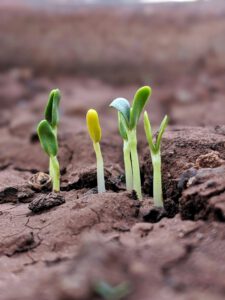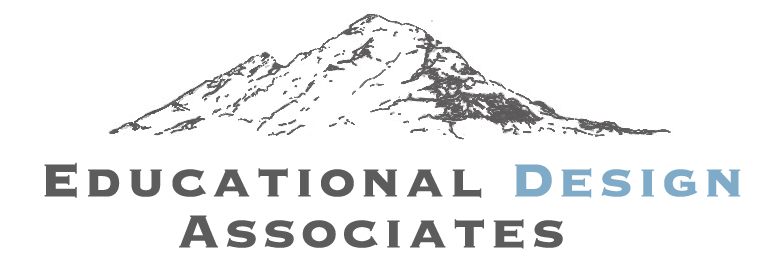
Photo credit: Chris Montgomery
Something surprised me in a group discussion recently. I love surprises: They have so much to teach us!
Our group was meeting on Zoom, planning a workshop on a tight timeline. We were down to our next-to-last meeting, and it was time to finalize a plan. The meeting started with open discussion, and we spent most of our hour in a rich dialog… only marginally related to the topic our workshop.
The meeting felt very alive, but we weren’t planning. As we reached our final ten minutes, in a brief exchange, we suddenly settled on a plan – in moments! It was as if a latent progress had been awaiting the perfect moment to emerge. And it arrived in its own time, coming out of our collective energy.
This outcome was highly surprising. Yet it wasn’t illogical. It just followed its own pattern. The workshop we were planning ended up going beautifully. The most memorable thing, though, was how this one planning meeting delivered the breakthrough we needed.
As I reflected on this experience, one thing that came up was that our group allowed the process to unfold organically, which made the unexpected possible. We had an agreed-upon goal but were as committed to aliveness as to any specific outcome. We listened to both our individual truths and to what came up through our shared truths. Suddenly, instead of being interested in the concept of emergent leadership I began actively investigating it.

Photo credit: Suraj Kardle
Emergent Leadership and the World
I’m no pioneer in this arena, but there’s a powerful alignment between emergent leadership, my personal/professional development, and the need for social transformation.
Our global culture is catastrophically misaligned with human and ecological health. There are certainly beautiful things happening everywhere that warrant celebration and delight. Yet at the same time, vast and needless suffering exists, and many of the trajectories we’re on are downright scary. We cannot ignore the creaking, crushing inequity of the global economy. Or the tumultuous climate crisis we have unleashed. Or the crumbling of what we’ve long held as democratic institutions. A powerful reorientation – a transformed perspective – is needed.
The need for new leadership approaches seems obvious. We’re familiar with the Einstein quote “We cannot solve problems with the same kind of thinking that created them.” In the meeting described earlier, I experienced the power of a new form of leadership. I glimpsed an approach to collective action that can make a new world possible.
Leadership, Inside and Out
A tenant organizer tells his story:
I’d been working in a building where conditions were terrible. People there were becoming active – word of mouth in the hallway, some informal meetings, a few natural leaders coming forward – all this even though folks were a little uncertain of themselves and looking to me and my knowledge and experience.
Just about the time I was getting some interest from the press, one of the women who was showing some leadership – Carmen, a great lady – realized the time had come where we could push the landlord and get some repairs. He was sufficiently worried to make concessions.

Photo credit: Pavel Neznanov
Problem was, some part of me wanted to hold off. I wanted to wait for a greater confrontation. There was a chance for some publicity, a chance to make a larger point about housing in the city.
Carmen made her pitch at a meeting: “Let’s go down there with certain demands, deal with this man, see what we can get. We’re strong, we’re ready.” She ran it down very well. People looked at me: What did I think?
This is a crucial point for a leader: the intersection between group energy and the leader’s inner agenda. This organizer has reached an edge. Here, Carmen holds him accountable:
When they were looking at me, I wasn’t looking at myself. I manipulated the meeting toward holding off confronting the landlord. I said we shouldn’t sell out too early. I was going for my own agenda. I was persuasive, all the things you learn as an organizer, and I won them over. They’d hold off on getting some immediate improvement in their lives.
As the meeting was breaking up, Carmen came up to me. She had this very won’t-leap-to-conclusions-but-won’t-take-any-bullshit look on her face. She said to me, very simply, “Are you being straight?” That’s exactly how she put it. She was right on. She saw it. And she was giving me the chance to see it too. After a moment, I said, “No, I’m not.”
So I got people reassembled and told them I’d realized that I had been pushing my own interests and viewpoint rather than hearing theirs. I said I thought that they should talk it all over again and I should leave. I’d made what in my work was a bad mistake. They understood. They said, “We still need you,” and I said “I’ll still be around.” But they started discussing it again.

Photo credit: Motoki Tonn
This story, from the beautiful book How Can I Help by Ram Dass and Paul Gorman, highlights a key point: If there is a foundational element in emergent leadership, it is the presence, or transformative capacity of the leader. Presence has both inward and outward aspects. Inwardly the leader stays true to what is happening in the moment, being self-aware and keeping ego and personal agendas in check. (This was the tenant organizer’s blind spot.) Outwardly the leader listens carefully and deeply, staying attuned to the subtle resonance of the group and the situation. Combining inward and outward dimensions makes a third dimension possible, wherein the leader helps precipitate change, stays open to being changed by the circumstances, and allows the unknown to arise.
Let’s call this competency one for emergent leadership: the presence of the leader.
Through my Aikido training I have learned the concept of misogi, or purification. Misogi implies that to be a warrior, one must be in alignment with authentic spirit, since life-and-death situations demand peak presence and immediacy. To build the sort of vibrant presence we are discussing, leaders like this tenant organizer need to pursue some kind of path of purification to get “clean” of hidden agendas and shadow issues. Practices such as meditation and mindfulness help leaders access inward and outward presence and serve what is evolving within a group.
Building Containers for Love
A recent group discussion, in which I was practicing sensing the collective, offered another window into the idea of emergence.
In this case, our group was reviewing a decisionmaking process. I’d been one of the group’s more vocal members, but this time I opted not to speak. During the discussion, I found that nearly every bit of input that I might have offered was voiced by someone else, at almost the exact time when I might have spoken! I felt connected with everyone, and hope rose in me like a big yeasty bowl of warm dough. When a colleague commented “We haven’t heard Daniel’s perspective yet,” I was happy to report that my views were being beautifully articulated by others!

Photo credit: Freestocks
Was that leadership? Or just receptivity? What seems true is that in that moment I was part of a container for emergence, and we were all there to foster the group’s evolution. A shift certainly happened; but not because of me. Instead, our group became an energetic field for, well, emergence. Emergence is more like midwifery than house construction: The process is organic and natural (albeit high-stakes and dramatic), rather than linear and controllable. The capacities involved include listening, empathy, and presence, not organizing, scheduling and sequencing.
Leadership in this context involves affirming what others already know rather than telling them what they need to do. It means honoring that which is unknown and might arise, welcoming uncertainty and hidden potential. The emergent facilitator maintains a commitment to the group’s higher potential — without seeking to shape or define that potential.
But it isn’t a passive process. All the skills that constitute skilled facilitation, like being inclusive, helping create focus, and attending to the group remain relevant. Yet emergent leadership goes further. Here, listening is an active verb. It requires hearing and sensing others on a deep level, listening to what in the group “wants” to emerge, attending to the subtle movement of a group as it evolves. It means suspending judgment and holding opinions lightly. Allowing multiple truths to coexist. Being open to being changed. Building tools for group coherence. And maintaining deep compassion – not just for the individuals and the group but for what might be welling up through those present. Emergent leadership is a co-creative process.

Photo credit: Jason Goodman
This may sound a bit woo-woo. But imagine a typical meeting where things are being discussed and decided – the energy is flat, perfunctory. The results reflect that energy. Now imagine a setting that feels fully alive and engaged, with vibrant connections between all those present. A different sort of result becomes possible!
In Otto Scharmer’s words: “You can’t lead systems change unless you sense and actualize the future that is wanting to emerge. That really leads to the essence of leadership.” Scharmer works at the unfolding edge of leadership, helping the shift from one cultural paradigm – one wildly unjust and unsustainable – into a new, life-affirming paradigm rooted in meaningful and healthy human relationships.
So competency two at the core of emergent leadership is creating a space for meaningful and generative dialog. “Creating space” means bringing people together intentionally, cultivating deep listening, nurturing co-creation, and attending to the growing edge that is coming forth. Emergent leadership embraces individuals, the group, and the future.
This embrace requires a certain kind of love. Another emergent writer, adrienne maree brown, articulates this beautifully: “Emergent strategy is how we intentionally change in ways that grow our capacity to embody the just and liberated worlds we long for… it’s a philosophy for how to be in harmony and love, in and with the world.”

Photo credit: Li An Lim
I have long been a change agent and activist. It’s often been a struggle. I have come to see that hardship as reflecting the Finite Game, seeking to “win” by pushing policies supporting human well-being and ecological integrity. These are worthy values! But I have switched to the Infinite Game, trading win/lose dynamics for building meaningful human connection. This approach also aims at systemic change, yet holds greater promise for helping us create “the more beautiful world our hearts know is possible.” Emergent leadership offers a new consciousness and a renewed sense of hope and direction. Can we embrace this new paradigm?
And What About this Troubled World?
I don’t know about you, but I often find myself seesawing between the bright and beautiful and the dark and depressing. It’s hard not to feel joy when hearing owls at night, watching a child play, harvesting onions. At the same time, these moments of bliss exist alongside the global realities of injustice, hunger, violence, greed, and innumerable threats to our biosphere.
Clearly, I benefit from substantial privilege that cushions certain hardships and allows generous access to bliss. Many folks would love to be on the seesaw I’m on – because so much of their experience is on the downside of the tipping plank.

Photo credit: Chetan Kolte
What inspires me into emergent leadership is that it offers an inclusive, wholistic embrace of polarities like the seesaw. To get beyond going up and down all the time, we need to shift to a new level. Given the global meta-crisis that we face, anything less than a profound shift to a new level will not suffice.
What is this new level? It needs to reflect a transcendent or overarching meaning, a perspective that sees all of humanity as unified in purpose and destiny. I think of our shared destiny as the Tao, or the “path,” for that label hints at a destiny that unfolds naturally on its own. There are other labels. The label doesn’t matter, but the expansive perspective does. Being expansive is less about working at it and more about opening to it. No calculation is required to embrace intuition regarding our shared fate.
But this position requires courage. A transcendent position does not mean sitting and meditating all day. It means dedicating oneself to help build global systems that will truly serve all of humanity and our ecosphere. It means acting upon the understanding that people and nature are inseparable parts of one living system.
I propose that competency three for emergent leadership involves tuning into the big picture, or transcendent purpose, of our shared destiny and acting accordingly. This competency places the first two in relation to our collective destiny, animating them and linking them with the state of the world and our place within it. This does not imply the existence of a specific transcendent purpose or spirit, but rather opens us to any possible unifying force.
We Are Each Agents of Change
Does this mean you have to dedicate your life to climate justice or become a tenant organizer to be an emergent leader? No: There are as many settings for emergent leadership as there are jobs. And one does not need to be an identified leader to support emergence within a group. Our calling is to manifest as fully as possible the behaviors that foster a just and sustainable world. The three competencies I’ve identified offer only one possible guide for our efforts to build that world.
What we can each offer is courage to change. A willingness to let go of assumptions and entrenched beliefs to find common ground with others. Deep listening to find empathy for people with different belief systems. The capacity to suspend judgment and hold seemingly contradictory truths at the same time. Openness to the unexpected, to allowing things to unfold in new directions. A commitment to moving beyond fear, since love and joy are more effective motivators than shame and guilt. And dedication to act.

Photo credit: Daniel Kirkpatrick
Emergent leadership can have an immediate impact since it brings to the current moment the kind of principles needed for a sustainable and just world. All the attributes listed above contribute to the individual presence, shared co-creative space, and transcendent purpose that will help us move past our current dysfunctional systems. Each of these competencies offers both an immediate and longer-term pathway to change.
Presence (Competency One) gives us an authentic and selfless position from which to precipitate change. Being authentic and selfless offers liberation for everyone who gets there! At the same time, the quality of presence we are able to manifest itself brings a transformative potential to all our relationships.
Creating Space for Emergence (Competency Two) means establishing a co-creative process for groups to reach their full capacity for collective wisdom. While this is an effective strategy in the moment, it also brings good results with nearly any group. Out of the space we create, new practices that better serve humanity and our ecosystem can come forth.
Recognizing Transcendent Purpose (Competency Three) calibrates our work to higher-order principles of unity and transcendence. In today’s world, unity is in short supply, and we can benefit immediately from the humility that arises from holding to spiritual principles. And by keeping open the channel of our common spirit, our oneness as beings, leaders both model and promote greater purpose.
This is a lot to take in… and I’ve barely scratched the surface. Each of these could (and may) become the subject of its own essay. But will these strategies be enough? Nobody knows. What I know, however, is that the qualities fostered by emergent leadership represent a powerful path toward a positive future.
I find great inspiration in this potential – and I also honor and uphold what you have to offer: the courage to expand your changemaking capacity and the willingness to serve the transformation we are facing. Please offer your comments below: I’d love to hear about how you see these tools working for you!

Photo credit: NASA

Thank you for sharing your enlivening, liberating, exciting experiences! They remind me of three things in my experience recently: returning to Aikido practice, where being completely present and attuned is essential to what we are doing; learning and being open to facilitating discussion and discernment in Quaker meetings; and editing books on Nonviolent Communication. There is so much hope in the magic of connection.
Aikido, the Quaker faith, NVC — all of these are vital paths in my life that have helped me become the leader that I am. Now I feel pulled to a whole new level of leadership, one that embraces the emergent potential coming online in the rise of a new cultural paradigm. You speak to the magic of connection, Virginia, which is way of characterizing the necessarily collaborative future we are building. Glad to be exchanging these ideas with you!
Daniel – Thanks and (as usual) very inspired by your words! They help me process and clarify my learnings in becoming a better leader.
My emergent purpose is with couples and intimacy.
Looking forward to continuing reading your blog!
I appreciate your comment, Valdo. I am glad all of us can work to support each other’s leadership — there is such a great need for good leadership in today’s world!
Thank you, Daniel, for this beautiful and inspiring peripatetic walk through your thoughts on emergent leadership. You pack much into a single blog post! While a vast majority of what you wrote resonates with me there is one thing that I find myself wondering about: is organic unfolding within a group synonymous with emergent unfolding, or is organic unfolding/processing within a group necessary but not sufficient for emergence to occur. Like you, I have witnessed groups committed to an organic process have unforeseen breakthroughs that resulted in fruitful outcomes. But I have seen similar groups get stuck in endless sharing and processing that is ultimately unproductive. They just don’t seem to have the breakthroughs that other groups do. So, the question for me is, what’s the magic juice that leads to one organic group being productive and another stuck in endless sharing? Could it, by chance, be the deep listening for what “wants to happen”, a tapping into a future that is just one step closer to “the more beautiful world our hearts know is possible”, as well as a synergistic synthesis of what everyone in the group has shared (sort of a push from the group that comes from processing/sharing and a pull from the future that comes from letting go of all that has been said, resting in silence and presencing what wants to come next)? Curious what you and others think.
Dave, what a rich reflection you have articulated here! I have some ideas (but no answers!) on the relationship between emergent and organic process. This I think would be worth exploring further. For now, I offer an affirmation of your wisdom: I think you’re spot-on with your comment on deep listening. In my experience, “endless sharing and processing that is ultimately unproductive” is absolutely linked to a lack of deep listening. Which of course is easier to identify than to implement. But this is our work: reaching deeply into a form of listening that truly connects us, while opening the door into our collective wisdom. I love having perspectives like yours to explore this territory with! Thanks!
A beautiful blog and beautiful comments. I do agree that listening is one core element. We use and teach Deep Listening (capital L!) as articulated by Warren Ziegler, former professor at Syracuse. He called it ‘a version of Taoist praxis’. Not only for listening to others, and listening for what wants to emerge; but also listening to oneself, what Warren called ‘listening for the voice of my spirit’.
Thanks so much, Marilyn, for your thoughts and for your recommendation regarding Deep Listening. I love the phrase “listening for the voice of my spirit.” It moves me to wonder: How much change could be effected in the world if we simply got a whole lot better at deep listening?
Thanks, Daniel, for distilling your thoughts so eloquently. I am applying your 3 competencies to my moderating work at ForumWithin.
I very much liked and identify with your analogy of emergence as more like midwifery than construction work.
Jenni — I’m so grateful for your response. If the emergent leadership approach is valuable to you, I’m honored! Of course, I’m finding it super useful myself or I wouldn’t be publishing on the subject. Also: I agree, midwifery is a vibrant metaphor. Your comment brings to my mind the idea of building a society upon matriarchal values rather than patriarchal ones. Once in my life, I visited a place (the state of Kerala, in southwestern India) which was heavily influenced by matriarchal clans. The wisdom of women in this area gave rise to better child care, health care, education, and elder care than I’ve encountered almost anywhere else in India or the world. As we face a global metacrisis, one thing we can certainly do is to more actively listen to the voices of women!
Thank you for this broad essay that touches upon so much! Ha Ha… You noted that each of your principles could be its own essay: I wait with anticipation!
I love Otto Scharmer’s phrase, “Energy follows attention.” Simply sharing of the past and present may not give rise to the emerging future without observing, reflecting with open heart/mind/will, and clear individual and group intention. But maybe, per Dave Ketter’s query, there are hidden or fragile conditions from which emergence arises – safety, critical mass of individual capacities, or hell, maybe even spukhafte Fernwirkung!
Thanks, Lisa, for your perspective! I’ll try to build upon this piece, though I have so many other essays in the works that it might take a while. I think you are absolutely on point with your note about further requirements for emergence, like observing, reflecting, intention, safety, critical mass.
And “spukhafte Fernwirkung?” I had to look that one up, and am delighted with the concept (even though the word itself may never escape my mouth intact!). Spooky action at a distance. Mystery. The unknown. Fate.
Yes, I’d say that holding space for that which we cannot understand seems vital as we encounter the many manifestations of the metacrisis!
Thanks for sharing these reflections on emergence and leadership, Daniel! Your dedication to your own ongoing learning for the betterment of all beings radiates throughout this piece, and this theme resonates with me greatly as a group facilitator. The competency of creating a space for emergence chimes particularly w my experience. I often think of this as adding nutrients to the soil of a group, cultivating supportive conditions for what is meant to grow.
I’ve found emergent group process benefits from structure as well as looseness, expansion as well as contraction. Emergence happens at neither end of this spectrum, but rather in the dance between these poles. As a facilitator a key part of the “presence” I seek to contribute is to listen into which direction the group needs to lean in each moment in support of the birthing process.
Appreciate you!
Tim, knowing a bit about your impressive work, I take these comments as very valuable. I’m especially intrigued by two of your comments. The first, in which you draw upon the metaphor of fertilizing the soil, is reminiscent of adrienne maree brown’s work in which she draws richly upon ecological metaphors. As a writer and someone who spent the early part of his career in outdoor and environmental education, I think our ability to implement living metaphors to better frame our social experience is vital. (It gets old to hear repetitive techno-metaphors like “having the bandwidth” or “downloading new information” even though I have used those phrases myself!)
The second piece I appreciate you illuminating is the expansion and contraction dynamic of group process. To me as a martial artist this seems best viewed as an energy dynamic, and attending to energetic flows is a facilitation skill that doesn’t always get the attention it deserves. My sense is that your attunement to this dynamic is part of what makes you, Tim, so effective.
Thanks so much for your response!
Read the Oct 30th blog entry – used it recently in a meeting with the young person who is about to be the only paid staff left to run my old program through the rest of the winter and the spring until they finally interview and hire someone. She wants to be a manager type – so it was very appropriate. And she, like myself, is more self centered than she is even vaguely aware of. So again, great things for her and I to think about here.
Mark — thank you for posting this comment! I’m super glad that the essay was useful to you and your new staff member. That’s really my great hope, to offer ideas that can help others live and work more powerfully. Getting responses like this help me to know that I’m on the right track. I’d love to hear how this person does as she settles into her new position. If she is trying to evolve in her leadership from a managerial approach to an approach that fosters emergence, she should know that she is not alone — a lot of us are working to make this same shift.